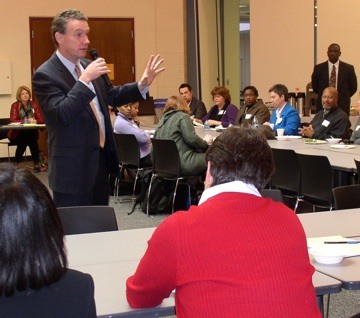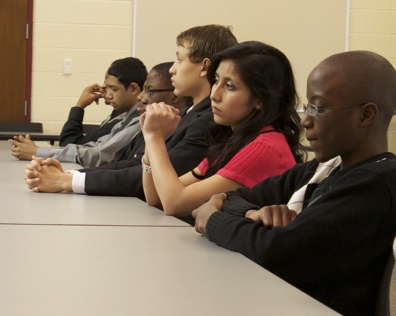Following is a video of some of Peter Cunningham’s interaction with Pioneer High School government students:
By Casey Hans
AAPSNews Service
Teachers, students and Ann Arbor administrators got a chance to hear and offer their thoughts last month to Peter Cunningham, the assistant secretary for communications and outreach at the U.S. Department of Education.

Cunningham had a roundtable discussion with teachers, met with government students and heard a presentation about some of the district’s top programs. He visited Pioneer High School on Jan. 21, after spending the morning in the Detroit Public Schools. Pioneer teacher Tracey Van Dusen, who is serving as a classroom fellow in the department’s Teaching Ambassador Fellowship program, accompanied him throughout his day.
“We’re the small player here,” he told staff, noting that the U.S. Dept. of Education’s role is to spearhead initiatives, such as the Race to the Top, to encourage change within public schools.
He said that although the RTTT funded projects in only 11 states and the District of Columbia, that the initiative prompted 40 states to adopt new standards to improve education. “It forced people to come together to do some things they never would have done,” he said.
Cunningham said the department is trying to amend No Child Left Behind use the department’s visibility to create change, but that large pots of money for education are not likely coming.
“There’s no big, bold new agenda here,” he told teachers. “Title III – we’re trying to get a little more money for it. But the state and local bailouts are over. We’re not going to do a whole lot more. But what we can do is identify promising programs” and promote them, he said.

During the discussion with teachers, some talked with Cunningham promoting teaching as a profession. Some said they did not think young people were choosing teaching because technology firms and other private sector companies are wooing them and they see how difficult the job is.
“We’re in a box and there’s a lot of pressure building,” said Brit Satchwell, a sixth-grade math teacher who currently serves as president of the Ann Arbor Education Association. “At the same time, we have to expand the box and be open to change.” Satchwell called for “sensible accountability measures” to help move change forward.
Burns Park fourth-grade teacher Carrie Chester told Cunningham that the U.S. Dept. of Ed plays a critical role in creating change and advocating for education. “I get that at significant portion of money doesn’t come from you, but the bully pulpit is a big thing,” she said. “That’s important.”
Cunningham agreed, and said that the department tracks big picture trends and works to influence those. Of the 3.2 million teachers, half will retire in the coming decade and “we will be transforming the teaching force,” he said.
To that end, the federal government has undertaken a campaign to encourage more young people to study to become teachers. Its www.teach.gov website offers information such as certification and licensing, financial aid incentives, teacher preparation programs and job listings.
There are other, non-government initiatives playing a role. Pat Jenkins, lead teacher for the Communication, Media and Public Policy Magnet at Skyline High School, said her daughter is part of the Teach for America initiative (www.teachforamerica.org), a nonprofit that has put more than 20,000 teachers in 39 urban and rural regions around the country using a Peace Corps-type approach.
“It makes them think differently about issues of class and … gives them a different world view,” Jenkins said. “For the schools, it’s where the rubber meets the road.”
Cunningham said his department is looking with interest at Teach for America. “Teach for America has somehow made teaching cool,” he said. “We’re looking at it to see how we can take it to scale.”
Cunningham also spent time with Pioneer government students, who had many questions for the education leader. They raised concerns about the Michigan Merit Curriculum, which requires higher graduation standards and, for some students, has pushed aside creative classes and the arts, which Cunningham said could be problematic.
“I think it’s a risk, especially in low-performing schools,” Cunningham said. “The thing we need to compete with foreign countries is creativity. You should have a well-rounded curriculum. You ought to learn to bang on a piano, strum a guitar. You should to be able to write a poem, and do an expressive dance.”
Casey Hans writes and edits this newsletter for the Ann Arbor Public Schools. Reach her at hansc@aaps.k12.mi.us or call 734-994-2090.


1 Trackback / Pingback
Comments are closed.